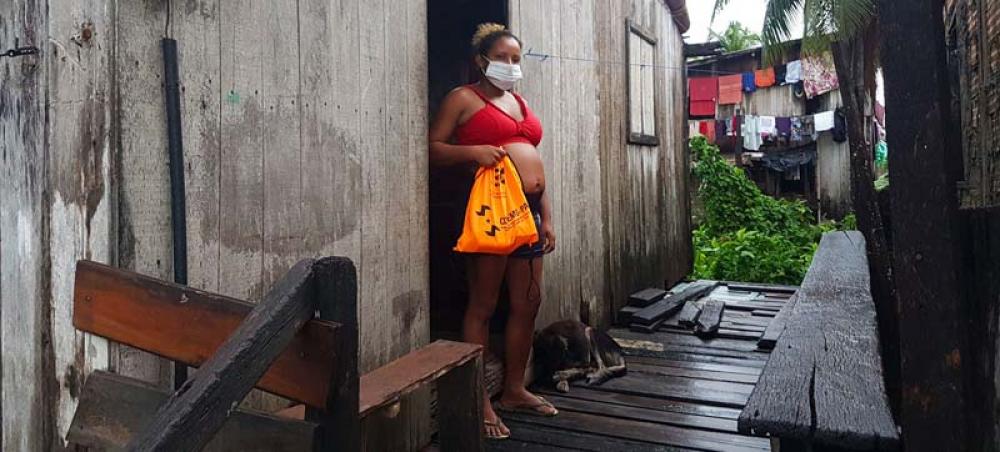Just Earth News | @justearthnews | 01 May 2021, 01:57 am Print
 Brazil Health Gains
Brazil Health Gains Image: UNFPA Brazil
New York: Although COVID-19 cases are declining in Brazil, the pandemic is putting decades of public health gains there at risk, the head of the World Health Organization (WHO) said on Friday.
With global attention and support focused this week on the severe crisis in India, WHO chief Tedros Adhanom Ghebreyesus used his regular media briefing to highlight the situation in South America’s largest country.
Brazil has been among nations hardest hit by COVID-19. More than 400,000 people have died from the disease, and over 14 million cases have been reported.
“Cases have now declined for four weeks in a row, and hospitalizations and deaths are also declining. This is good news, and we hope this trend continues. But the pandemic has taught us that no country can ever let down its guard”, said Tedros.
Scaling up support
Since November, Brazil has been battling an increase in cases, hospitalizations and deaths, including among younger people. Intensive care units across the country have been at almost full capacity this month.
“Brazil has a long and proud history in public health, with three decades of investments in strengthening primary health care and progress towards universal health coverage. But the pandemic has hit Brazil’s health system hard and threatens to unravel those gains”, Tedros said.
WHO and its regional arm, the Pan American Health Organization (PAHO), are working with the Brazilian authorities to provide medicines and other urgently needed supplies, including oxygen and masks.
Brazil is also scaling up domestic production of COVID-19 vaccines, Tedros said.
Newly appointed Health Minister, Dr Marcelo Queiroga, said the Brazilian authorities are also accelerating vaccination efforts, including through better distribution of doses.
Vaccinating a South American giant
Dr. Queiroga said the country’s “diversified strategy” for the pandemic includes partnerships for technology transfer, bilateral contracts with pharmaceutical companies, and participation in the global vaccine solidarity mechanism, COVAX.
“Currently, we are distributing more than 60 million doses of vaccines, and we have already applied more than 41 million doses”, he said, speaking through an interpreter. “Nonetheless, we still have a long way to go because we need to be able to vaccinate 2.4 million people every day.”
The Health Minister appealed for countries with extra vaccine doses to share them with Brazil. He also spoke of action to support indigenous people, reporting that more than 500,000 doses so far have been distributed.
Americas overwhelmed
Overall, the Americas has been the region most affected by the pandemic, according to WHO.
Countries such as Peru, Ecuador, Bolivia, Argentina, Uruguay and Guyana have reported a dramatic rise in infections, and health services are overwhelmed.
Dr Ciro Ugarte, Director of the Department of Health Emergencies for WHO/PAHO, said several countries have seen an increase in cases among younger people.
“These are linked to increased exposure and no vaccination in this group as most countries have few vaccines and are applying them to vulnerable older groups and healthcare workers,” he explained.
A bleak outlook
PAHO is helping countries to plan for a needed sudden increase in the use of oxygen, intubation, drugs and personal protective equipment, and to improve protection for health workers.
Dr Ugarte underscored the need for more vaccines in the region, including through COVAX and donations.
“COVAX has delivered 7.3 million doses in Latin America and the Caribbean so far, but the need for vaccines is much greater”, he said. “Many countries cannot afford large bilateral deals with producers and are relying on COVAX for vaccines, but the outlook is not optimistic for increased supplies soon.”
Moderna vaccine Emergency Use Listing
The Moderna COVID-19 vaccine has been listed for emergency use, WHO announced on Friday.
It becomes the fifth vaccine to receive the validation, which is a prerequisite for being included in COVAX.
Emergency Use Listing (EUL) assesses the quality, safety and efficacy of COVID-19 vaccines. It also allows countries to expedite their own regulatory approvals to import and administer doses.
The Moderna vaccine had previously been reviewed by WHO’s expert advisory group, SAGE, which in January recommended its use for people 18 and above.
The other vaccines WHO has listed for emergency use are by Pfizer/BioNTech, Astrazeneca-SK Bio, Serum Institute of India and Janssen.
- New hybrid Mpox strain surfaces in UK and India — WHO sounds global alert
- Deadly weight: Obesity now responsible for 1 in 10 infection deaths worldwide
- Coffee and tea: This everyday drink may help protect your brain from dementia
- Happy Chocolate Day! The sweet secret behind chocolate’s hidden benefits
- Cambridge study finds menopause affects memory, mood, and sleep





-1763561110.jpg)
